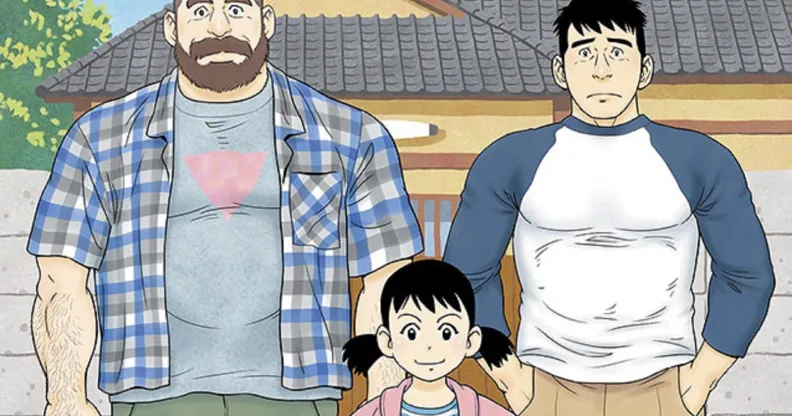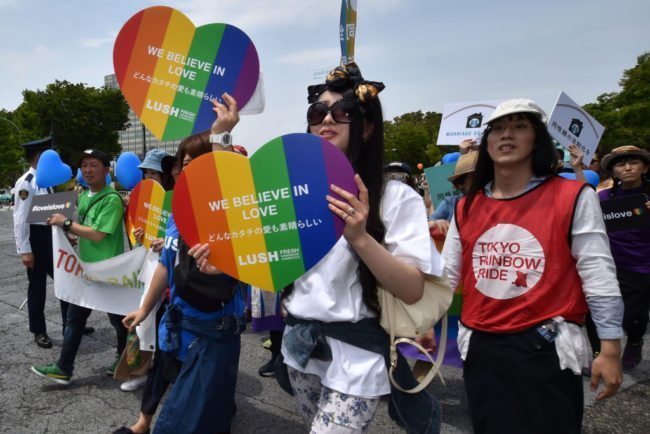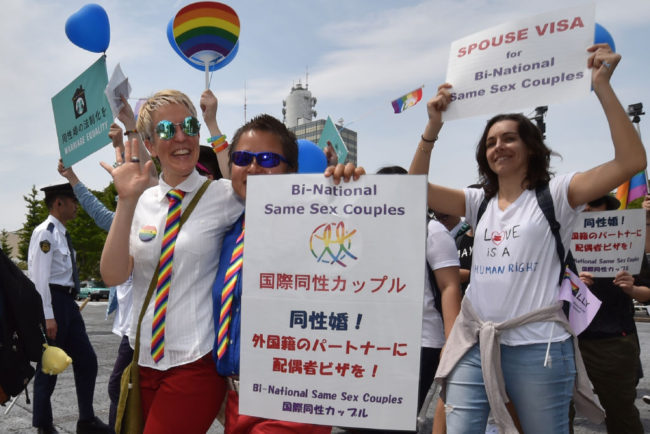Japan’s national broadcaster orders TV show about gay couple

Japan’s national public broadcaster has commissioned a TV show about a married gay couple.
NHK, the Japan Broadcasting Corporation, picked up the three-episode series based on manga series My Brother’s Husband, created by gay author Gengoroh Tagame.
The manga tells the story of Yaichi, a man struggling to deal with the death of his gay twin brother, Ryoji.
Yaichi and his young daughter Kana’s lives are disrupted when they meet Ryoji’s gay Canadian husband, Mike Flanagan.

The broadcaster says Ryuta Sato will play Yaichi and ex-sumo wrestler Baruto Kaito has been cast as Mike Flanagan.
The show will debut in March 2018 on NHK’s BS Premium.
Gengoru Tagame said: “When I was drawing ‘My Brother’s Husband’, I wanted as many people as possible to experience this story.
“Over the past few years, same-sex marriage has been legalized in many countries across of the world. One day it may be discussed in Japan.
“Before that point, people should [be educated] about gay relationships. I wanted everyone to understand different types of people.
“So this adaptation is welcome. I hope this story will be shared with many more people through the medium of television.

“For me, it’s the first time my manga has been adapted into live-action.
“I am excited to experience the story as a fan, rather than as a creator.”
Ryuta Sato added: “Having read the original story, it was so emotional, and I was nearly in tears from the beginning to the end.
“I look forward to adapting it for the drama version.”
The drama will challenge stigma in Japan, where being gay and interracial relationships are both still somewhat culturally taboo.

However, the country is becoming progressively more liberal on LGBT rights.
There is no nationwide recognition of same-sex relationships in Japan, and same-sex couples are not legally able to adopt – but a movement is building to change the law.
Some regions operate schemes providing limited recognition to same-sex couples.
Earlier this year Sapporo became the first major city in Japan to issue official partnership papers to those who wish to enter a legal same-sex union.
Any two people who are over 20 years old and live in the city can sign a partnership vow, after which they will receive copies of the vow and a document from the city indicating its legality.

(Photo by TORU YAMANAKA/AFP/Getty Images)
A 32-year-old woman was one of the first to receive recognition of her same-sex union under the new law.
She told Japan Today that she was “delighted I was finally able to do it”.
“It may be self-satisfaction but I want other people to use the system without caring what people around them think as they can become happy.”
The official certificate the couples receive doesn’t give them full legal rights, but does ensure that they can become each other’s life insurance recipients.
The change in Sapporo came after a public consultation that led to an overwhelming 1,500 people writing in to support the proposal.
And a record number of people attended Tokyo Pride in May, following a series of steps towards LGBT equality in the country.

(Photo by YOSHIKAZU TSUNO/AFP/Getty Images)
Elsewhere this year a city in Japan became the first to recognise a first same-sex couple as foster parents, with the gay couple in Osaka officially fostering a teenage boy.
And there are other signs that young people in Japan are becoming more liberal.
A former New Zealand MP was left baffled earlier this week, after discovering he had become a gay icon.
Maurice Williamson, who used to represent Pakuranga in Eastern Auckland, has gone viral in the Asian country, thanks to a speech on gay marriage he made four years ago.

In his now iconic address to parliament in 2013, the National Party politician argued: “We are only legalising equal marriage, not nuclear war.
“I’ve had a reverend in my local electorate say, ‘The gay onslaught will start the day this law is passed.’ Well, we are struggling to know what the gay onslaught will look like.
He adds: “We don’t know whether it will come down the Pakuranga Highway as a series of troops or whether it will be a gas that flows in over the electorate that blocks us all in.”
“I also had a Catholic priest tell me I was supporting an unnatural act. I found that quite interesting coming from someone who has taken an oath of celibacy for his whole life. I haven’t done it so I don’t know what it’s about.”
At the time, the impassioned and humorous speech quickly rose to internet stardom, where the former minister also claimed there was a “big gay rainbow” over his constituency.

In a surprising turn of events this month the former MP has become a big hit in Japan, earlier tweeting how it was “so unexpected”.
The clip resurfaced after comments by the General Council Chairman of Japan’s Liberal Democratic Party, Wataru Takeshita, who said gay partners of state guests should not be allowed to dine with the Emperor or Empress of Japan.
He later apologised for his remarks.
One Japanese Twitter user then posted the video of Williamson’s speech with Japanese subtitles in response to the comments, adding it was “a speech that was admired worldwide at that time.”
They also dedicated it to the “young people who haven’t heard it.”

